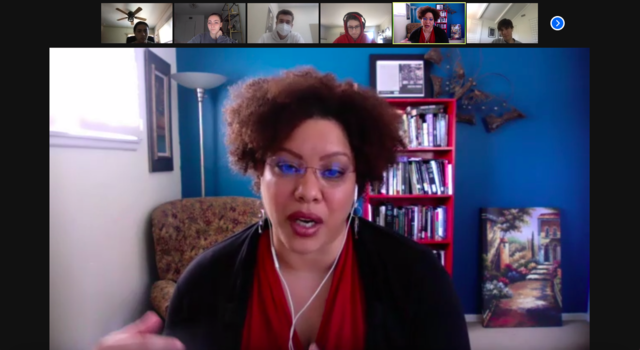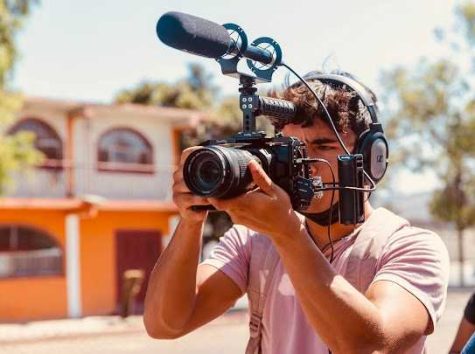Kutler Center Resident Stephanie Batiste speaks in press conference
Batiste answers a staff member’s question during the Zoom event.
March 21, 2021
The 2020-2021 Kutler Center Scholar in Residence, Associate Professor in the Black Studies and English departments at the University of California Santa Barbara (UCSB) Dr. Stephanie Batiste ’90, will speak with students and faculty at several events this month.
Batiste, the author of “Darkening Mirrors: Imperial Representation in Depression Era African American Performance,” spoke about race-related issues in a press conference with Chronicle staff on March 19.
Chronicle Assistant Features Editor Kate Burry ’22 asked Batiste about the difference between cultural appreciation and appropriation, especially with regard to artistic expression, a field in which Batiste specializes.
“Mostly in the United States and in the West, cultural appropriation has meant European and white cultures appropriating Black cultures,” Batiste said. “If something feels stolen, then often we’re talking about a kind of appropriation that moves toward annihilation.”
Various staffers asked Batiste questions about her education, writing process and opinions on race-related topics
Batiste defined Critical Race Theory as a school of thought that exists to help people understand race as a fundamental component of life in the United States in order to foster a greater understanding of the subject.
“Critical Race Theory, in and of itself, to me seems like algebra,” Batiste said. “It seems like a really basic offering that allows us to address and analyze a tsunami force in our society that people have an impoverished, syntax, basis for.”
Chronicle Editor-in-Chief Hannah Han ’21 asked how the Chronicle newsroom could better avoid implicit bias in their journalism. Batiste said that the goal should be to welcome voices with a wide range of experiences and perspectives.
“Going and making sure that you have one Black person represented is problematic,” Batiste said. “You often need more than one person in order to demonstrate that there’s also a diversity of opinion and approach within racial and ethnic groups.”
This month Batiste will meet with different groups of students, covering a variety of topics.
“I’m certain that each conversation is going to be different,” Batiste said. “The context and the framework in each class, whether I’m in the Law, Cinema Studies, or the Latin American Studies class are going to be very different based on what students are studying.”
Batiste will use a discussion format in her class visits to engage with students
Since her time as a student at Westlake School for Girls, Batiste has been vocal, speaking out against racism.
“It would be fair to say that my last days at Westlake School for Girls were not without controversy,” Batiste said. “I wrote a letter to the newspaper, observing unfortunate, but very clear racism in an accusation that none of the Black women in my class (and there averaged about 10 Black students out of about 110 in the class over my six years) deserved to get into the colleges to which we were admitted. The more competitive the college, the less we were worthy. I have a lovely letter of support from college counselor Pat Henning, who wrote in the deafening silence that followed my letter’s printing.”
Director of Kutler Center and Director of Summer School Programs Jim Patterson said that Batiste was specifically chosen to be the resident to address issues of diversity, equity and inclusion, as well as the pandemics of racism and COVID-19.
Parsons said that he is looking forward to hearing Batiste’s perspective on the current school environment and how it has changed from the 1990s.
“I’m excited to hear her impressions of the school,” Patterson said. “I’m interested in hearing how the community has evolved.”














































